IELTS Writing Task 2 Grammar Tips – Common Mistakes and How to Avoid Them
Grammar is a crucial part of your IELTS Writing Task 2 score, and mastering key grammar rules can help you avoid common mistakes. In fact, IELTS scoring guides make Grammatical Range and Accuracy worth 25% of your writing mark. This means that careless errors – even in just a few sentences – can significantly lower your band. High-scoring test-takers are expected to make only “a few, infrequent” mistakes. To help you write grammatically accurate essays, this article highlights common grammar pitfalls (with examples) and shows you how to fix them.
Use Correct Verb Tenses
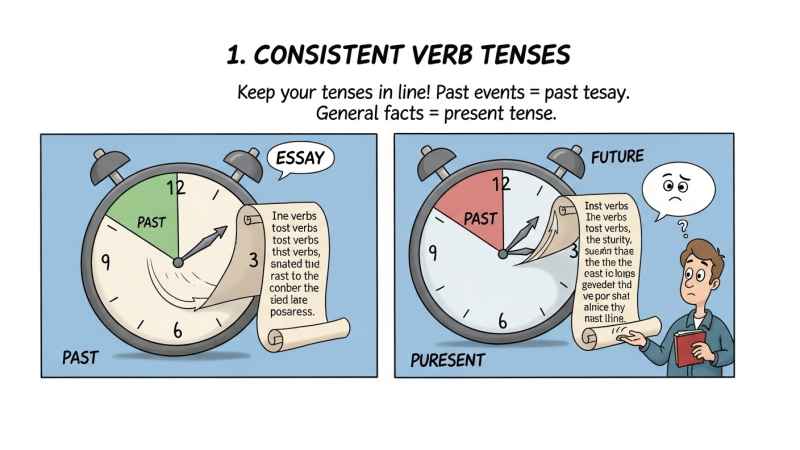
In IELTS Task 2, choose verb tenses that match the time frame of your ideas. For example, when describing events in the past, use past tenses; when giving general facts, use the present. Switching tenses mid-sentence or using the wrong tense can confuse the reader. A simple tip is to plan your essay timeline: decide if you are talking about past events, current trends, or future plans, and stay consistent. For instance, if you start a paragraph saying “Last century, scientists discovered new planets,” keep the past tense throughout that discussion. Avoid saying “discover” (present) in the next sentence if you are referring to the same past period. If you need to compare past and present, clearly signal the shift: e.g. “Last century, scientists discovered new planets. Today, space technology allows us to explore even more.” By keeping your verb tenses consistent with the time you describe, your writing will be clear and error-free. (Tip: Words like yesterday, last year, currently, recently can help you choose the correct tense.)
Ensure Subject-Verb Agreement
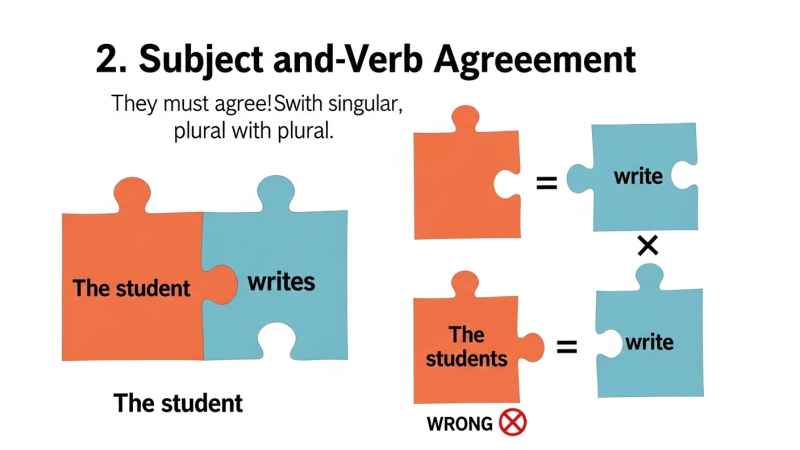
Always make the subject and verb match in number. In other words, use a singular verb with a singular subject, and a plural verb with a plural subject. As IDP IELTS explains, “in a sentence, the subject and verb must agree”. For example, say “The man has 10,000 books” (singular “man” with singular “has”), not “The man have 10,000 books.” Likewise, say “The members of the committee are in the meeting room” (plural “members” with plural “are”).
Pay special attention to tricky cases: if a sentence starts with a gerund or -ing form (which acts as a noun), the verb must still agree with the subject that follows. For example, “Writing essays is challenging,” not “Writing essays are challenging.” If you’re unsure, identify the true subject and then pick the correct verb form. Simple checks like ensuring “he is/they are,” “it has/they have,” and “she does/we do” will catch most errors. In short, double-check that every singular noun has a singular verb and every plural noun has a plural verb.
Choose Articles (a/an/the) Carefully
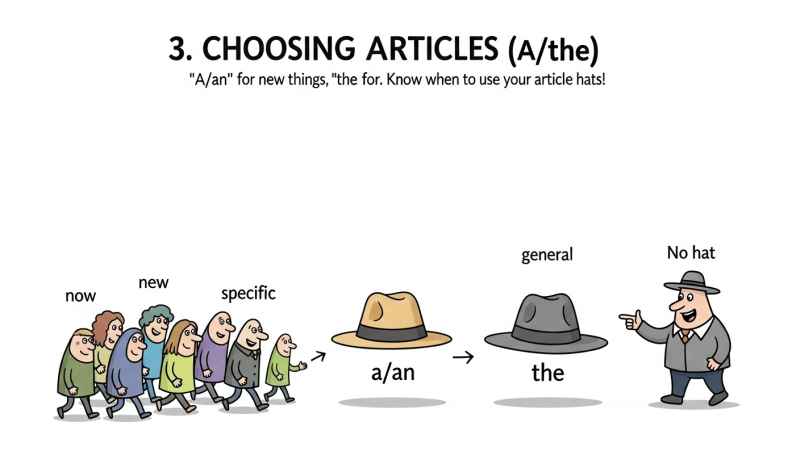
Using articles correctly is a common challenge for IELTS students. The British Council notes that “the misuse of articles” is a frequent error, even among advanced learners. Here are some friendly reminders:
- Use “a” or “an” for new singular things, and “the” for things already mentioned or unique. For example, “A student wrote an essay.” (first mention, so indefinite “a/an”). “The essay was interesting.” (now it’s a specific essay, so “the”).
- Use “the” with specific groups or names that are naturally definite. For instance, “the USA,” “the Middle East,” or “the University of Oxford.” Also use “the” with superlatives and ordinals, e.g. “the highest score,” “the first task.” Magoosh confirms: “We use ‘the’ before places where the name refers to a group of islands or states (the USA, the Middle East), cardinal numbers (the first day of the month), and superlatives (the highest)…”.
- Remember proper names of countries and cities usually do not take “the” (e.g. “China,” “Paris”), but group names do (*“the United States,” “the United Kingdom,” “the Philippines”).
If articles confuse you, practice identifying whether a noun is general or specific. Often, rephrasing with “this/that” can help: if this noun or that noun fits, you probably need “the.” By paying attention to these patterns, you’ll avoid unnecessary article mistakes.
Handle Countable vs Uncountable Nouns
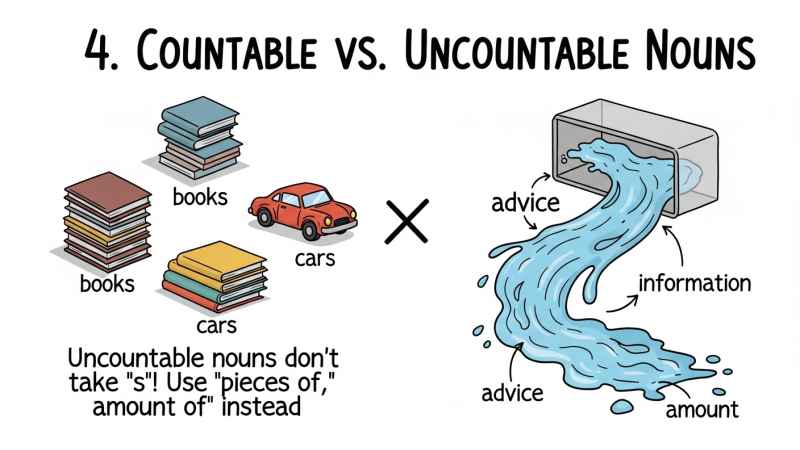
English has many uncountable nouns that should never take plural “s” or a number directly. Common examples in IELTS writing include “advice,” “information,” “research,” “news,” etc. For these, do not say “advices,” “informations,” “researches.” Instead, treat them as singular or use quantifiers. For instance:
- Incorrect: “I received three advices about studying.”
- Correct: “I received three pieces of advice about studying.”
- Incorrect: “The government conducted several researches.”
- Correct: “The government conducted several studies.”
In general, add quantifiers like “a piece of,” “some,” “a lot of,” “research shows,” “information is” before uncountable nouns. As Magoosh points out, these words always stay singular: “There are some nouns in English that are uncountable… You can NEVER make them plural by adding ‘s’ or ‘es’.” Practice by writing down academic noun lists. When you mean quantity, convert to countable phrases: e.g. “two pieces of equipment,” not “two equipments.” By keeping uncountable singular, your grammar will stay accurate.
Use Prepositions Correctly
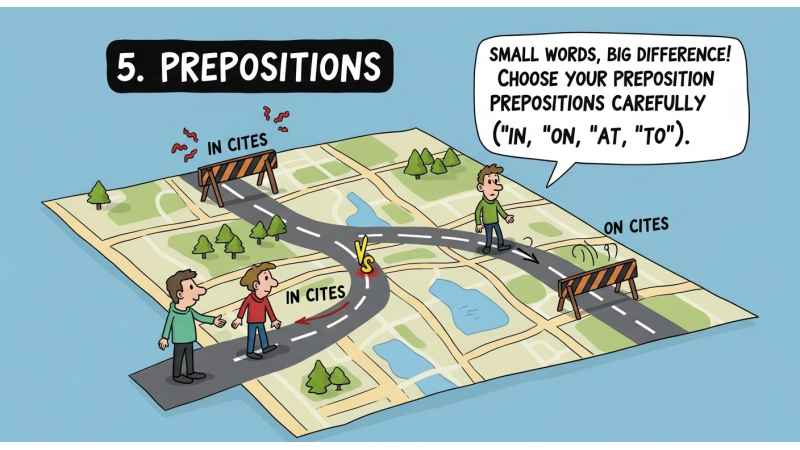
Prepositions (in, on, at, to, for, etc.) are small words but they can change meaning or be easy to get wrong. Common IELTS errors involve prepositions with places and verbs. For example, say “in cities”, not “on cities”, as in “People are worried about pollution in cities,” not “on cities.” Similarly, say “focused on improving,” not “focused in improving.” One way to improve is to learn common collocations (word pairs) and phrases: for instance, “interested in,” “depend on,” “responsible for,” “concerned about.” When in doubt, check a reliable source or remember short rules (e.g. “at” for precise locations or times, “in” for general places, “on” for surfaces or specific dates). Practicing preposition usage in context (e.g. through example sentences) will help you instinctively pick the right one. Over time, using the correct preposition with each verb or noun will become natural.
Quick check: If you write “worried about pollution on cities”, correct it to “worried about pollution in cities.” If you write “rely in somebody”, correct it to “rely on somebody.” Keeping a list of common verb–preposition pairs (like “apply for,” “account for,” “participate in”) can save you from many small errors.
Avoid Comma Splices (Join Sentences Correctly)
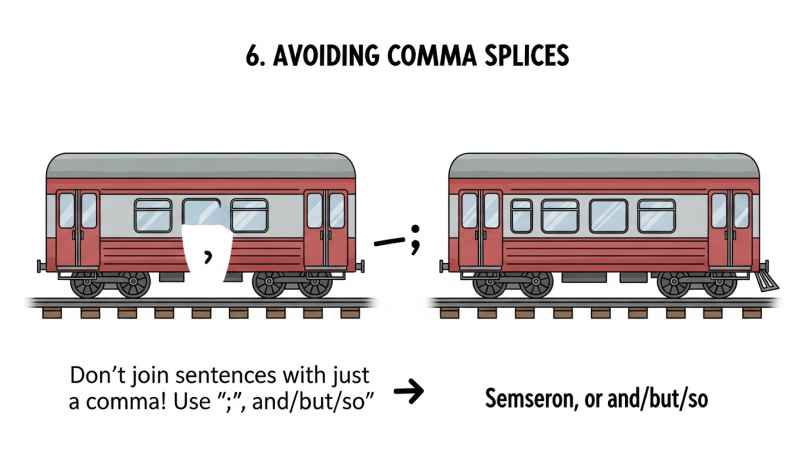
A comma splice is when two complete sentences are wrongly joined by just a comma. In IELTS writing, this mistake costs points. Remember: an independent clause (complete sentence) must end, or be connected properly. You have three safe options:
- Use a semicolon ; if the ideas are closely related: “More people use smartphones than ever; connectivity is at its highest.”
- Use a coordinating conjunction (and, but, so, or, etc.) with a comma: “More people use smartphones than ever, and connectivity is at its highest.”
- Or split into two sentences: “More people use smartphones than ever. Connectivity is at its highest.”
As Magoosh emphasizes, “you cannot combine two complete sentences with just a comma”. For example, avoid “Connectivity is rising rapidly, the world is becoming more connected.” Instead write “Connectivity is rising rapidly; the world is becoming more connected.” or use “, and.” Always read each comma and ask: “Are these two independent clauses?” If yes, fix it. Properly punctuating sentences will greatly improve your grammatical accuracy.
Avoid Sentence Fragments (Write Complete Sentences)
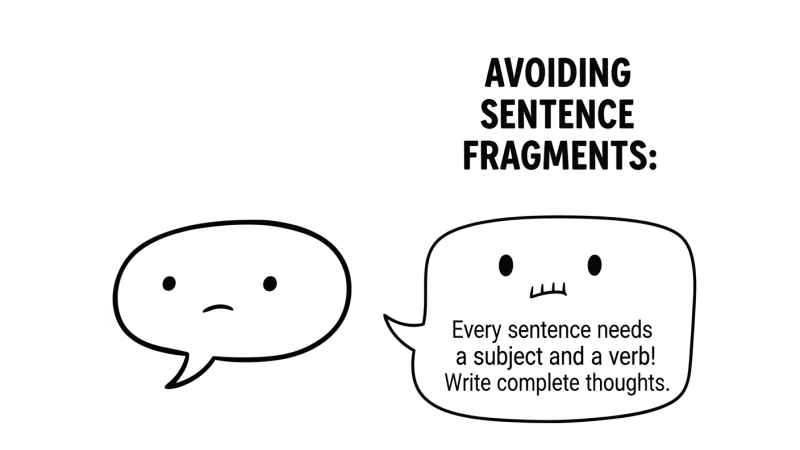
Every sentence in your essay should have at least one subject and one main verb. A fragment is an incomplete sentence, often missing the subject or verb. In IELTS Writing Task 2, fragments often happen with subordinate clauses. For example:
- Fragment (missing subject): “Shut the window on his hand.”
- Complete: “The boy shut the window on his hand.”
- Fragment (missing verb): “After I start university.”
- Complete: “I will come home less often after I start university.”
- Fragment (dependent clause alone): “Because we are late.”
- Complete: “We missed the meeting because we are late.” (or “Because we were late, we missed the meeting.”)
If you begin a sentence with a word like “After,” “Because,” “Since,” “When,” etc., make sure it is attached to a full clause. The IDP IELTS site warns that fragments “mean a subject or main verb is missing”. To avoid them, read each sentence and see if it forms a complete thought. If not, add the missing part (subject or verb) or join it to another sentence. By ensuring every sentence is complete, you’ll eliminate fragment errors that cost you marks.
Keep Sentences Clear and Concise
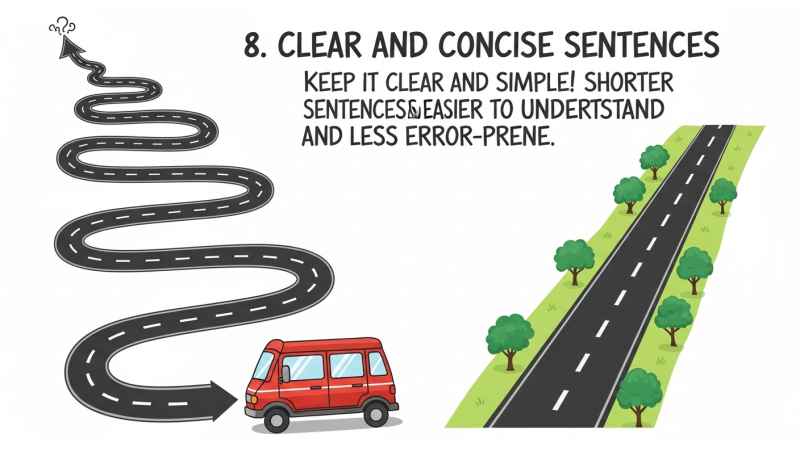
IELTS examiners prefer well-structured, clear sentences over long, convoluted ones. Writing complex ideas is good, but don’t make your sentences so long that they become unclear or error-prone. The British Council notes that “long, complicated sentences with too many clauses…make your writing difficult to follow, and it’s easier to make grammatical mistakes.” In other words, clear grammar often goes hand-in-hand with concise style.
Focus on one main idea per sentence. If a sentence has more than two or three clauses, consider splitting it. For example, instead of writing “Although some people think education should focus only on practical skills, because the job market demands it, others argue for a broader curriculum, believing that students also need creativity,” break it up: “Some people think education should focus only on practical skills because the job market demands it. Others argue for a broader curriculum, believing that students also need creativity.” Shorter sentences like these are less likely to contain mistakes and are easier for the reader (and examiner) to follow. As one IELTS instructor advises: an extra comma where one isn’t needed is often worse than a missing comma. In practice, use simple punctuation (periods, commas, capital letters) correctly, and avoid overloading a sentence. Crisp, well-punctuated sentences will make your arguments shine and keep grammar errors at bay.
Use Formal Style: Write Numbers and Avoid Contractions
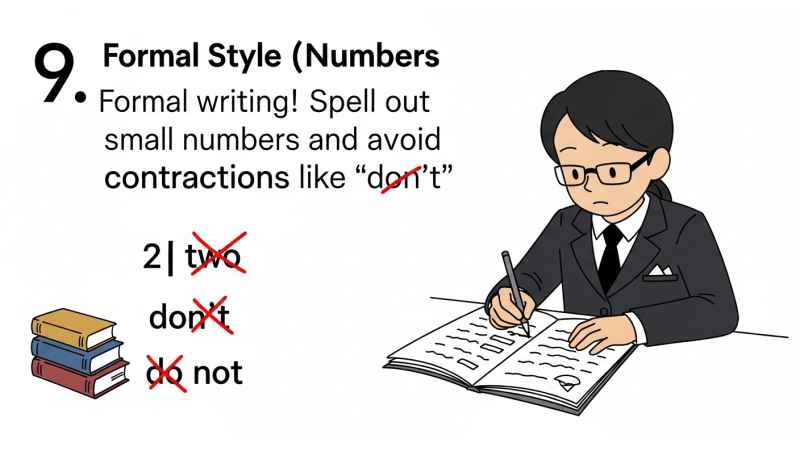
IELTS Writing Task 2 is an academic-style essay (for both Academic and General Training). That means your tone should be formal. Two common pitfalls in formality are number formatting and contractions:
- Write numbers as words: Instead of writing digits, spell out numbers one through ten and use numerals for 11 and above if needed (though spelling out large round numbers is also fine). For example, say “only two out of ten people”, not “2 out of 10 people.” Magoosh warns that using digits is considered a shortcut and is marked down: “This shortcut has its place in some writing, but should not be used in the IELTS Writing exam”.
- Avoid contractions: Formal writing generally does not use contractions. Write “do not” instead of “don’t”, “cannot” instead of “can’t,” “I will” instead of “I’ll.” The examiner will notice contractions as a casual tone. As Magoosh points out, test takers “will lose silly points for making” this mistake. Practice writing full forms in essay practice to make it natural. For example:
- Instead of “It’s important to reduce pollution,” write “It is important to reduce pollution.”
- Instead of “That’s the best solution,” write “That is the best solution.”
Using formal language shows examiners that you know the difference between spoken and written English. Combining this with correct grammar (non-plural nouns, precise prepositions, no comma splices, etc.) will give your essay a polished, high-band tone.
Quick Grammar Checklist
By now you’ve learned the main grammar areas to watch in Task 2. Here’s a friendly checklist to help you remember:
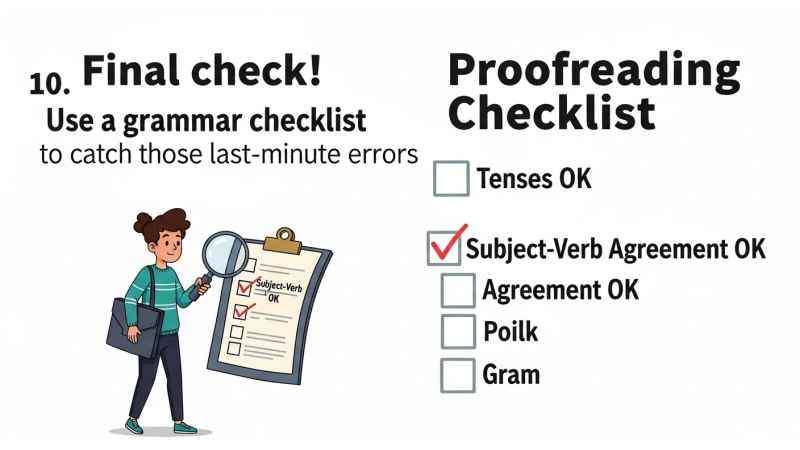
- Tenses: Keep verb tenses consistent and appropriate to your time frame.
- Subject-Verb Agreement: Match singular subjects with singular verbs (and plurals with plurals).
- Articles: Use a/an for non-specific singular nouns, and the for specific items or unique things.
- Countable/Uncountable Nouns: Don’t pluralize uncountable like “advice” or “information”. Say “some advice,” “a piece of research”, etc.
- Prepositions: Use the correct small words with verbs and nouns (e.g. “in cities,” “focused on,” “interested in”, etc.).
- Punctuation: Avoid comma splices. Use semicolons, conjunctions, or separate sentences to join ideas properly.
- Sentence Structure: Write complete sentences (no fragments). Keep sentences clear – if it’s too long, split it.
- Formal Style: Write out small numbers in words and skip contractions (write “will not” not “won’t”).
Make a habit of checking these points every time you write practice essays. With careful proofreading and practice, you can eliminate most of the common grammar mistakes and boost your IELTS Writing Task 2 band score.

About the AuthorWelcome to TechIELTS. I’m Md. Jahangir Alam, an experienced engineer with over 15 years in electrical and automation systems. Alongside my engineering career, I’ve developed a strong interest in English language learning and IELTS preparation.
I hold a Duolingo English Test score of 135 (IELTS 7.5 equivalent) and am currently pursuing an M.Sc. in Cyber Security from Royal Holloway, University of London. I use my technical background to create clear, structured IELTS learning materials for students and professionals.
👉 Connect on LinkedIn
